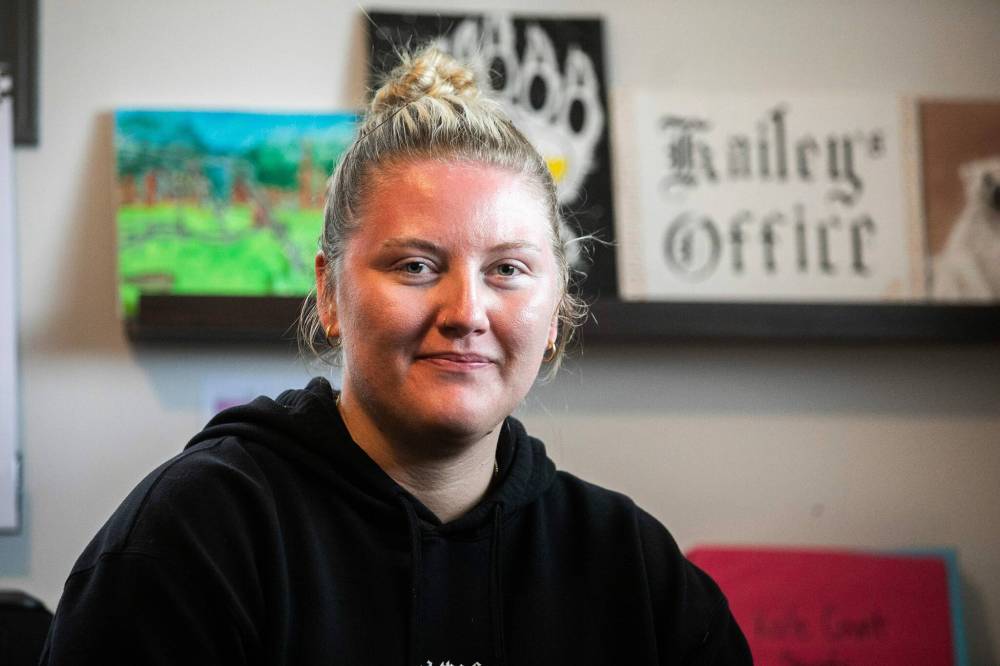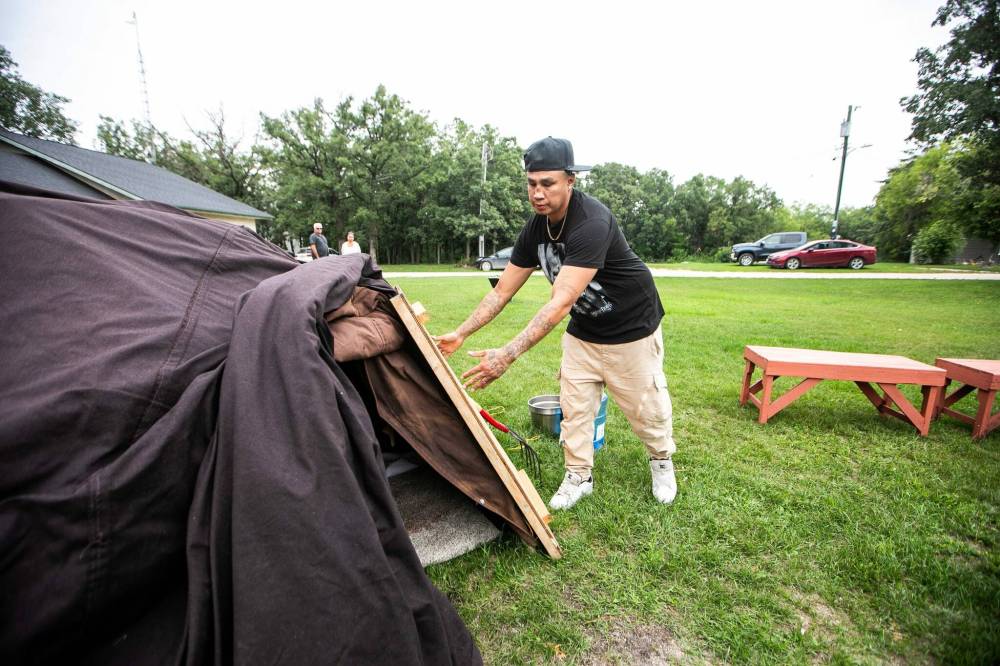Breaking the cycle of FASD-related crime and punishment Specialized court helps Manitobans with fetal alcohol spectrum disorder, but stigma and scarce resources remain barriers
Read this article for free:
or
Already have an account? Log in here »
To continue reading, please subscribe:
Monthly Digital Subscription
$0 for the first 4 weeks*
- Enjoy unlimited reading on winnipegfreepress.com
- Read the E-Edition, our digital replica newspaper
- Access News Break, our award-winning app
- Play interactive puzzles
*No charge for 4 weeks then price increases to the regular rate of $19.00 plus GST every four weeks. Offer available to new and qualified returning subscribers only. Cancel any time.
Monthly Digital Subscription
$4.75/week*
- Enjoy unlimited reading on winnipegfreepress.com
- Read the E-Edition, our digital replica newspaper
- Access News Break, our award-winning app
- Play interactive puzzles
*Billed as $19 plus GST every four weeks. Cancel any time.
To continue reading, please subscribe:
Add Free Press access to your Brandon Sun subscription for only an additional
$1 for the first 4 weeks*
*Your next subscription payment will increase by $1.00 and you will be charged $16.99 plus GST for four weeks. After four weeks, your payment will increase to $23.99 plus GST every four weeks.
Read unlimited articles for free today:
or
Already have an account? Log in here »
As the Crown attorney’s sentencing argument to the judge nears the one-hour mark, it is interrupted by a defence lawyer.
The lawyer’s client, a teenage girl dressed in a baggy sweatshirt — sitting with a Manitoba justice department official, her therapist and a child-welfare worker in the gallery — is scanning the room, her attention seemingly lapsing at her sentencing hearing for a robbery.
“Do you need a break?” provincial court Judge Cynthia Devine gently asks the teen, who nods in affirmation.
It’s mid-afternoon in an otherwise unremarkable provincial courtroom in late July and Devine, whose demeanour already tends to be softer than many of her peers on the bench, is overseeing a sitting of Manitoba’s fetal alcohol spectrum disorder court.
The girl has been diagnosed with the disorder — a brain injury of varying severity caused when a fetus is exposed to alcohol in utero — and has significant deficits in her cognition and ability to comprehend the effects of her actions.
Many people with FASD, a lifelong disability, struggle to understand the consequences of what they do and connecting cause-and-effect. They often have poor impulse control, struggle to learn from mistakes and develop drug or alcohol problems.
Those deficits often result in conflicts with the law.
While it’s difficult to quantify how many offenders with FASD come in contact with the criminal justice system or the associated costs — it is significant. An oft-cited 2015 study of the financial impacts of FASD on the Canadian justice system pegged the annual national figure at an estimated $3.9 billion.
Offenders with FASD appear in Manitoba’s courtrooms every day, from petty thieves who police say repeatedly breached court orders to accused killers with rap sheets a mile long.
That’s why efforts, such as Manitoba’s special FASD court, are critical in dealing with individuals who become entangled in the justice system.
The court is one of three unique problem-solving courts in the province. The other two focus on drug and mental health-related cases. It gives special consideration to how offenders’ intellectual and social deficits may have contributed to their crimes when sentencing select youth and adult offenders diagnosed with FASD.
The hope is that those who go through the court — if given the right tools and supports to live a better life — won’t get caught in a cycle of re-offending that befalls many of those with FASD.
Provincial court Judge Mary Kate Harvie first witnessed the significant negative impacts of FASD while working as a defence lawyer years ago.
“It was one of the things that you knew about, but there was no real way to get your hands on any of this information for your clients,” Harvie said.
Later, after she was appointed to the bench in 2000, she gained greater understanding when an FASD diagnostic report was submitted for a youth she was sentencing.
MIKAELA MACKENZIE / FREE PRESS Provincial Judge Mary Kate Harvie was instrumental in setting up the fetal alcohol spectrum disorder (FASD) court. 
“It was just such an eye-opening thing, because it really, to me, explained so much of the behaviour,” she said.
“As (I) read the probation report, even the way the offence was committed, it felt like there was something missing, and then I got this report, and it was like, ‘This explains everything.’”
In the years since, Harvie has become one of the driving forces behind a push to promote better understanding of the complexities and challenges the provincial justice system faces when dealing with offenders diagnosed with FASD.
Following consultations with the Manitoba FASD Centre — a service run out of the Winnipeg Regional Health Authority that conducts assessments, education, training and research on the disorder — Harvie and other justice officials established a pilot program for young offenders with FASD in 2004, supported by federal funding, before the province took over and made the project permanent. It has since expanded into the current FASD court, which began sitting in 2019.
The judges who sit on the weekly court have training and education on FASD, and receive medical reports and other relevant information ahead of the proceedings.
“We can modify the proceedings so that we can take into account the challenges the individual might have,” Harvie said.
“We can also recognize the link between that and the offending behaviour, and we can tailor our sentences to try to take that into account, so that we can work towards keeping these individuals out of trouble and out of the system.”
“We can modify the proceedings so that we can take into account the challenges the individual might have.”–Judge Mary Kate Harvie
The court operates in partnership with the provincial justice department’s FASD program, which helps offenders access a diagnosis if one hasn’t been made, works with family members and others to put together information on offenders’ specific deficits and issues for the court, and develops a supported-living plan. Justice department officials refused an interview request to discuss the program from the government’s perspective.
The judge said she believes the court has improved outcomes, as the justice system across the board becomes more attuned to issues surrounding FASD.
“The biggest successes relate to recognizing this is a significant issue within the justice system and really shining a light on this problem, and not just saying, ‘Hey we’ve got a problem here,’ but actually doing something about it,” said Harvie.
“And really, (we’re) starting to see some really significant changes for people who come through the court, who have really struggled.”
However, the court and the provincial justice program have limited resources, Harvie said.
The weekly special court can only take on a fraction of those with diagnosed or suspected FASD in Manitoba who are waiting to have their charges heard. Defence lawyers must apply to have their clients’ cases, which can include everything from minor breaches to serious crimes, heard in the court.
“The workers that are in there tell me they’ve got a filing cabinet full of referrals — people they can’t get to because they don’t have enough supports, they don’t have enough workers working in the justice program to provide them with supports,” Harvie said.
“That’s a big frustration for people working in the justice system, I totally get it.”
Critical community supports, such as housing to accommodate people with complex needs and a criminal background, are also limited.
“We have a population of people with an invisible disability that we aren’t catching, we aren’t diagnosing, and they’re caught up in the justice system … What do we do about it?” Harvie asked. “Well … supported housing, more community supports and resources. I think there needs to be a significant increase in that type of support.”
“We have a population of people with an invisible disability that we aren’t catching, we aren’t diagnosing, and they’re caught up in the justice system … What do we do about it?”–Judge Mary Kate Harvie
She said FASD affects every branch of the justice system, as well as society more broadly.
“People are very sympathetic, I think, but at the same time, take the not unreasonable position that they don’t want their house broken into or their car stolen or their family members assaulted, or anything like that,” said Harvie.
“So I think society looks to the court to do something about this, and either do it by getting them supports, or do it by locking them up, or whatever is necessary. I think there is the expectation that the court will do something — and we’re trying.”
Currently, it is unclear how prevalent FASD is in Canada.
Public health officials have acknowledged there’s a lack of firm data, resulting in “an important knowledge gap.”
Federal health officials estimate around one per cent of Canadians have FASD, while the Canada Fetal Alcohol Spectrum Disorder Research Network has estimated it’s as high as four per cent.
And people incarcerated in Canada’s jails and prisons are disproportionately likely to have confirmed or presumed FASD, experts say.
Despite the statistical shortcomings, Harvie, other justice officials and those who work with people with FASD, are in agreement that it’s a massive issue.
“It is a big problem. What’s really interesting… is the lack of actual data in terms of actual prevalence in the justice system,” Harvie said.
She pointed to a 2011 study of Stony Mountain inmates that found about 10 per cent of participants had FASD, while another 15 per cent met some of the criteria, but officials did not have all the information required to make a confirmed diagnosis.
Other studies involving federal inmates have suggested as many as 25 per cent may have the disorder.
“We’re not talking about two or three per cent — we’re talking about a significant part of the population within the justice system,” Harvie said.
But, she notes, those with FASD are not necessarily “bound for a life of crime.”
“The earlier we can get someone diagnosed, the earlier we can identify the deficits and provide support that are appropriate for the deficits. The earlier we can provide accommodations and keep somebody on the right path and really have a very successful life,” said Harvie.
“It’s a problem out there, it’s a problem that still struggles from a lot of stigma for the mothers, stigma for people with the diagnosis. So trying to break down those barriers is a challenge.”
It was early in Don Shackel’s career, while working in the mental health and addictions field in northern Ontario, when he met a woman who had given birth to a child with FASD.
That started him on a path that has included work with the Interagency FASD Program in Winnipeg in the 1990s and with northern First Nations as an FASD specialist.
“Connecting the whole issue of fetal alcohol and the justice system, I come at it from a different perspective,” said Shackel, who is now the executive director of Initiatives for Just Communities, a non-profit that provides supports to adults with cognitive disabilities, including many with FASD, in Winnipeg and southern Manitoba. Earlier in his career, he worked as a corrections officer in Brandon.
MIKAELA MACKENZIE / FREE PRESS Don Shackel is executive director of Initiatives for Just Communities (IJC), a non-profit organization that provides support for adults with cognitive disabilities, including FASD.
IJC runs day and residential programming — where some participants live in supported but independent housing or with families — while helping participants gain basic life skills and structure. It also develops circle-of-care plans, where participants learn about their disabilities and develop a path forward in life.
“The majority of people we work with that have (FASD), we support them in an outreach program. So they could have anywhere between five to 30 hours of support a week, where they could live independently or with their family, and we provide help with basic needs,” Shackel said.
Shackel, whose career has largely been spent working with First Nations governments, noted his organization, other non-profits and the provincial government provide programming that isn’t available in Indigenous communities for adults. Much more disability support is available for youths under Jordan’s Principle, the federal government’s legal obligation to ensure First Nations children have access to proper health care, among other supports.
In recent years, IJC has added cultural programming and traditional healing — such as sweat lodges — for those they work with, a significant number of whom are Indigenous or First Nations.
But Shackel hopes to see more services made available in First Nations communities across the province, so adults with FASD don’t have to move south from their homes — where they are already connected to family and their culture — to receive the help they need.
“Those services help keep people out of incarceration,” he said.
People like Russ Hilsher.
Hilsher, now 48, was diagnosed with FASD as an infant shortly after being taken from his Ontario birth mother and placed into child-welfare care. He eventually landed in Winnipeg.
MIKAELA MACKENZIE / FREE PRESS FASD advocate Russ Hilsher (right) with his support worker Harri Vallittu at IJC.
Despite his criminal past — which includes a record for assaults, breaches of court-ordered conditions and theft, and saw him in and out of Manitoba’s jails — he’s given presentations about living with FASD to judges, justice officials, educators and others in Winnipeg and in northern Manitoba First Nations.
He knows first-hand that there are better options for individuals with FASD than cycling through jails.
“I think society really needs to take a look at restorative justice… not be afraid to try things… that’s what I always tell the judges, ‘You can’t be afraid to try things,’” Hilsher said in a recent interview at the IJC office in Winnipeg’s West End.
“They have so much power to send someone’s life in the right direction, or continue them down this path of in and out, in and out of incarceration… that’s what I tell the judges.”
He said he looks at the world differently than people without FASD, and that it takes him a long time to understand certain concepts.
“Let’s just say if this was left here,” he said, gesturing to a reporter’s voice recorder. “When you left and everybody else left, to me, that would tell me you didn’t want that anymore, and no one else seemed to want it, so why would I not take it? I’m not understanding that’s not mine, that it’s still yours.”
“I think society really needs to take a look at restorative justice… not be afraid to try things… that’s what I always tell the judges, ‘You can’t be afraid to try things.’”–Russ Hilsher
Hilsher, who lives in supported housing, is grateful to have been given a diagnosis, which has provided him better understanding of his behaviour.
“If I wasn’t diagnosed in my life, had things set up the way they are, I would be in prison or dead — that’s realistically, (with) no supports in place,” he said. “But because of the diagnosis and the supports I’ve received, that’s been avoided. I’ve been very fortunate.”
Hilsher’s longtime direct support worker, Harri Vallittu, said the difference in Hilsher from the early days working with him “is incredible.”
Vallittu thinks the justice system is beginning to better understand the issue.
“There seems to be a willingness now, it’s starting, that we’ve got to look at this problem with a different set of glasses here, zero in on it a bit more — why is it happening and what can we do to improve it? There have been some improvements,” he said.
“Every case is different, right… and just because you’ve done a crime and have FAS, you’re still responsible for it, but the punishment should be looked at differently. And it seems that it’s starting.”
Shackel turns off Highway 12 near Steinbach and heads down a series of gravel roads before turning his pickup truck onto a narrow driveway.
He gets out and, with sweat beading on a muggy July day, points to an eagle circling above where a fire burns in preparation for a sweat lodge.
Shackel is at El’dad Ranch, a program run by IJC where men with cognitive disabilities, including many with FASD, learn life and work skills, such as cooking and cleaning, and receive vocational training in areas such as cutting wood, basic carpentry and automotive mechanics.
MIKAELA MACKENZIE / FREE PRESS Meeko McDonald works on a painting at El’Dad Ranch. He has been a participant in the IJC’s alternative justice program at the ranch for two years.
Some of the men live at the ranch as part of the non-profit’s alternative justice program, either while on bail awaiting court proceedings, on probation or as a conditional sentence — essentially house arrest — instead of jail or prison, while others attend the ranch for day programming.
Meeko McDonald, a 37-year-old with FASD currently on probation for two counts of assault with a weapon, has been at the ranch for two years as part of the justice program.
While learning how to plan for life away from the ranch, he’s also begun to paint, draw and take part in cultural programming, and is working on his life skills. He’s hopeful he can break the cycle of re-offending.
“Every time I went to jail, I always told everybody I’m not coming back, then all of a sudden I come back. I guess the guys, even all the guards, are like, ‘I knew you were coming back’ …,” he said.
“It’s better. I like it here, more than Winnipeg anyways. When I (return) to Winnipeg, I want to come back a better person.”
MIKAELA MACKENZIE / FREE PRESS McDonald is hopeful the lessons he’s learned will break the cycle of re-offending.
Kailey Schultz has been the ranch’s alternative justice program’s co-ordinator for eight years, though she has spent time at El’dad since she was a child, when her father, Randy Schultz, helped set up the program.
“It’s a place to serve their jail time, or sentence, in a more meaningful way than what jail can offer them. Often, people with FASD can struggle to understand consequences and we’re able to provide wraparound case-management services in a place where they can learn and grow in a safe environment,” she said.
There is no question the approach works, she said.
“Even if there is a relapse, per se, into the justice system, I feel like we’ve been able to provide them skills that can still benefit them in a way, or reduce the harm later on in life, whether it’s to the community or to themselves, if they do end up going back,” she said.
MIKAELA MACKENZIE / FREE PRESS Kailey Schultz says the alternative justice program is making a difference, but similar services need to be made available for women and youth.
“We have seen some individuals that do not go back into the justice system … A lot of people give up on people in this demographic, with legal challenges, like there is no hope. But there is, and we cannot give up on people, never.”
In addition to working on practical and vocational skills, the men learn about boundaries, emotional regulation, mental health and how to address their addictions, in a stable and consistent environment.
“A lot of them didn’t have that growing up, to have stable environments. To be able to have, no matter what challenge comes up, we have a support for them — there’s someone there, we can support them through that, whether it’s the justice system or getting their kids back from CFS, or financial challenges, or budgeting,” she said.
“I think that’s how people with FASD can flourish, that wraparound case-management service.”
MIKAELA MACKENZIE / FREE PRESS Meeko McDonald helps prep a sweat lodge at El’dad Ranch where cultural programming is as important as learning life skills.
But there’s never enough, she said. She’s not sure there ever will be.
“We have four spots for the entire province and it’s just for men — we need to have a women’s AJP (alternative justice program), we need to have this for youth… I really wish we could expand our program, build onto the property, make more homes like this in our rural setting,” Schultz said.
“But it’s so hard — where do you get the resources?”
Back in the courtroom, Judge Devine learns more about the girl she’s about to sentence.
She wants to get a job in a restaurant or in a clothing store, and loves animals, but she has struggled in school, violently broken the law more than once and was recently moved from her long-term foster family’s home after she threatened her foster dad, following a disagreement over her bringing home cats.
Devine is pleased to hear the girl has a kitten at her new foster placement.
The prosecutor has asked for two years of probation, while her lawyer urges one year is enough.
She’ll continue to receive support from the FASD justice program for the next year, until she turns 18, when the provincial government’s disability services take over, her lawyer says.
The teen, who had previously pleaded guilty to robbery, listens as Devine sentences her to one year of probation with a number of supports crafted for her.
“Everything is in place,” says Devine, who begins with a story about a middle-aged man who was in FASD court earlier that day.
That man has similar deficits to her but recently finished his Grade 12 while in jail, with marks that were “quite high,” she says.
“How did he do it? How did he even manage that? Well, he said, ‘I need someone to sit down beside me and help me,’” Devine tells the girl.
“That is what you do. Sometimes, people have various kinds of disabilities, and you just make sure that they have the kind of support they need, and they can graduate high school, they can get a job in a restaurant, they can get a job in a clothing store — and I think you will. So just keep up the good work.”
Devine, who earlier in the hearing edited into plain language the court-ordered conditions she was about to impose, reads them out before explaining them to the teen.
The judge then wishes her luck — and tells her to go home to her cat.
erik.pindera@freepress.mb.ca

Erik Pindera is a reporter for the Free Press, mostly focusing on crime and justice. The born-and-bred Winnipegger attended Red River College Polytechnic, wrote for the community newspaper in Kenora, Ont. and reported on television and radio in Winnipeg before joining the Free Press in 2020. Read more about Erik.
Every piece of reporting Erik produces is reviewed by an editing team before it is posted online or published in print — part of the Free Press‘s tradition, since 1872, of producing reliable independent journalism. Read more about Free Press’s history and mandate, and learn how our newsroom operates.
Our newsroom depends on a growing audience of readers to power our journalism. If you are not a paid reader, please consider becoming a subscriber.
Our newsroom depends on its audience of readers to power our journalism. Thank you for your support.
